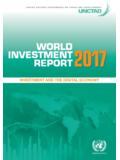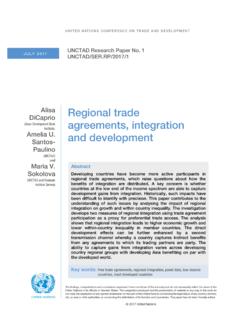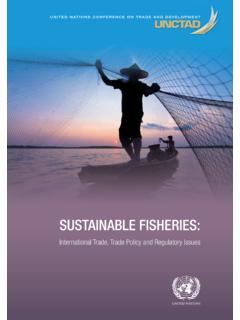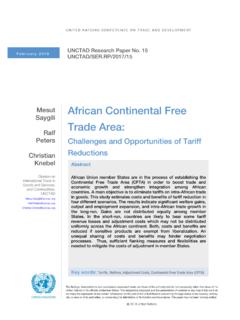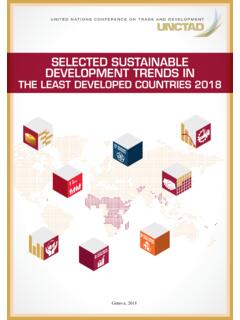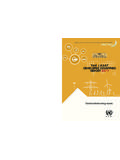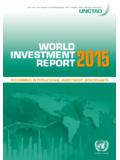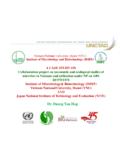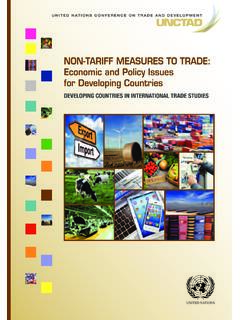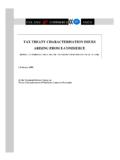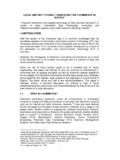Transcription of Towards Inclusive E-Commerce - UNCTAD | Home
1 UNCTAD /DTL/STICT/2017/7 1 | P a g e UNCTAD E-Commerce Week 2017 " Towards Inclusive E-Commerce " Geneva, Switzerland, 24-28 April 2017 SUMMARY REPORT This is an unedited document. UNCTAD /DTL/STICT/2017/7 2 | P a g e The UNCTAD E-Commerce Week 2017 featured a range of events aimed at contributing to the global dialogue on the need to make the development of E-Commerce Inclusive . This third edition of the Week saw the participation of over 1,000 representatives from governments, international organizations, the private sector and civil society from 99 countries. The entire week was successfully implemented thanks to collaboration between UNCTAD and 30 partners for the organization of more than 30 sessions. There were a total of 170 speakers and moderators, of which one-third were women and one-third from developing countries. The Week benefitted from the participation of Jack Ma, Special Adviser to UNCTAD for young entrepreneurs and small business and founder and chairman of Alibaba Group, as well as 11 Ministers and Vice Ministers and 7 Heads of international agencies.
2 Highlights of the Week included the High-Level Event on Digital Transformation for All: Empowering Entrepreneurs and Small Business, the first Ministerial Meeting of the Friends of E-Commerce for Development, the official launch of platform, and the first board meeting of Business for eTrade Development. The event have been reported on in some 475 articles in over 45 countries, including Reuters, EFE, Fortune, AFP, ATS. Sixty-five presentations and more than 10 contributions are available on "The 3rd edition of the E-Commerce Week has demonstrated beyond a doubt how the convening power of the United Nations and smart partnerships can bring out a shared sense of purpose, engagement and results. We all look to the future, firm in our conviction that together we will impact how E-Commerce works for Inclusive prosperity." Dr. Mukhisa Kituyi, Secretary-General of UNCTAD . UNCTAD /DTL/STICT/2017/7 3 | P a g e 24 April 2017 The first day saw ten parallel sessions related to E-Commerce by UNCTAD and the following partners: the World Bank, the Centre for International Governance Innovation, the Internet Society, IPSOS, the United States Federal Trade Commission, the National Foreign Trade Council, the Information Technology Industry Council, the Universal Postal Union, the International Trade Centre, the UN Economic Commission for Europe, the World Customs Organization, and AliResearch.
3 Cybersecurity and Cybercrime: New tools for Better Cyberprotection The session addressed the growing concerns of the rise of cybercrime and its consequences for privacy and security online, as well as the resulting lack of trust among consumers and governments to adopt digital technology. Participants recognized that a series of measures should be taken at the national and global levels. They should include enhanced co-operation between states and other stakeholders; consensus building around agreed international protocols that ensure the realization of an open, secure, and reliable cyberspace; harmonization of criminal justice systems, for example, around the Council of Europe s Budapest Convention, and implementing capacity building tailored to the needs of various stakeholders. Legal and regulatory responses should include criminalizing conduct, enhancing law enforcement powers, and putting into place cybersecurity frameworks that include prevention and permit active defense.
4 Three tools developed by international organizations were presented: the World Bank led Cybercrime Assessment Toolkit ( ) and the ITU led National Cybersecurity Strategy (NCS) Guide currently being finalized to assist governments in developing their cybersecurity strategies, as well as capacity development initiatives by the DiploFondation. Examples of the technological measures taken by Alibaba Security, as well as its efforts to build a security alliance with other actors in the E-Commerce ecosystem, as well as the role of blockchain technology on security were also highlighted. Global Survey of Internet User Perceptions This session presented new findings of a 2017 CIGI-Ipsos- UNCTAD -ISOC global survey of public attitudes in 24 nations on the Internet and E-Commerce . The survey is unique and only the third of its kind to have been conducted on such a global scale. National and regional variations in public were explored as will the broader implications of these findings for global E-Commerce and international trade.
5 The survey is available at Referring to this survey, Ms Anusha Rahman Khan, Pakistan's Minister of State for Information Technology and Telecom, said, "A majority of people are feeling insecure online, particularly girls and women. This tells us that there has been a lack of legal framework or tools which can provide the same security online as the users have offline." Data Protection, E-Commerce and Development Building consumer confidence in online shopping is one of the keys to E-Commerce development. The protection of personal data has become increasingly important in the digital economy. This session UNCTAD /DTL/STICT/2017/7 4 | P a g e discussed recent developments in the area of data protection and their implications for SMEs and consumers' engagement in E-Commerce , especially from a development perspective. It also highlighted the global state of law adoption worldwide with the release of the latest UNCTAD figures.
6 The Rise of Fintech and Impact on Consumer Markets and Competition Financial technology is changing the way consumers borrow, spend, and share money offering the promise of increased convenience and access to financial services. Unfortunately, there is also opportunity for risk and fraud. This panel explored the risks and implications of this financial technology for consumers and competition in global markets. Digital Trade and Online Work in Europe and Central Asia The session presented the ECA Regional report on Reaping Digital Dividends , with a special focus on digital trade and online labor market arrangements. The report identifies the main bottlenecks and argues that policies to foster competition, international trade and skills supply, as well as adapting regulations to the changing business environment and labor markets, will also be necessary. More information about the report can be obtained here ( ).
7 Data Flows and Development A Global Industry Perspective This session sought to build a deeper understanding among governments and stakeholders of how data flows are necessary component of development in the 21st Century where data powers the global economy. Cross-border data flows connect countries, cultures, companies, and individuals; they generate new sources of economic growth and employment and are helping to address significant public policy and development challenges, such as those under the Sustainable Development Goals. Private Sector Views on Priorities for E-Commerce This panel brought together private sector leaders to discuss new survey findings on E-Commerce development challenges in the developing world, solutions the private sector see as critical, and discussion on ways in which private sector can with governments create a new development paradigm, with private sector playing a leading role in the development and seeding E-Commerce -related development projects, and public sector backing and scaling best practices.
8 The private sector presented new initiatives to unlock E-Commerce markets and cross-border E-Commerce , such as via new solutions in logistics, payments and SME capacity-building. E-Commerce in Africa This session addressed the digital divide to leverage E-Commerce in Africa and examined the enabling framework for E-Commerce in the African region. According to the UNCTAD B2C E-Commerce Index 2016, Africa ranks the lowest in all the indicators related to E-Commerce readiness, namely Internet use penetration, secure servers per 1 million inhabitants, credit card penetration and a postal reliability score. Just over a fifth of the population in Africa uses the Internet. Unless there was improvement in the underlying transaction and logistics processes, African online commerce was likely to remain confined to wealthier populations in urban areas. This session provided useful tools for African countries develop E-Commerce .
9 The TrainForTrade programme, for example, which focuses on developing skills, knowledge and capacities through innovative development approaches based on a recognized pedagogical method and state-of-the-art technological solutions. The UPU presented various initiatives, UNCTAD /DTL/STICT/2017/7 5 | P a g e including a capacity building programme to assist countries to partake in E-Commerce activities; an E-Commerce Guide which provides comprehensive information regarding the opportunities for Posts in E-Commerce and how to participate in the E-Commerce market. E-Commerce and Trade Logistics: New Challenges and Opportunities for International Transport and Trade Facilitation The session considered the new challenges E-Commerce poses for traders and transport/trade logistics service providers, from both the public and private sectors, including the need for ever more efficient international transport and trade facilitation.
10 From the private sector perspective, there was little action to align customs procedures with rise of small business trade. SMEs have higher fixed costs of trade compliance but their compliance capabilities are less. It was suggested that development banks create E-Commerce capacity-building program for willing countries and help each economy assess net effects (including SME exports) of scenarios. Other concrete actions, such as PPPs with big data on E-Commerce shipments for customs security assessments (like ACAS), simplified compliance, and fast-track clearance for Trusted eTraders should be taken. From the perspective of public sector, the need for the industry to automate their global trade management operations was highlighted. Reliable, real-time order and logistics tracking systems for customers and customer support teams to monitor delivery to the final customer or door location should be encouraged.
